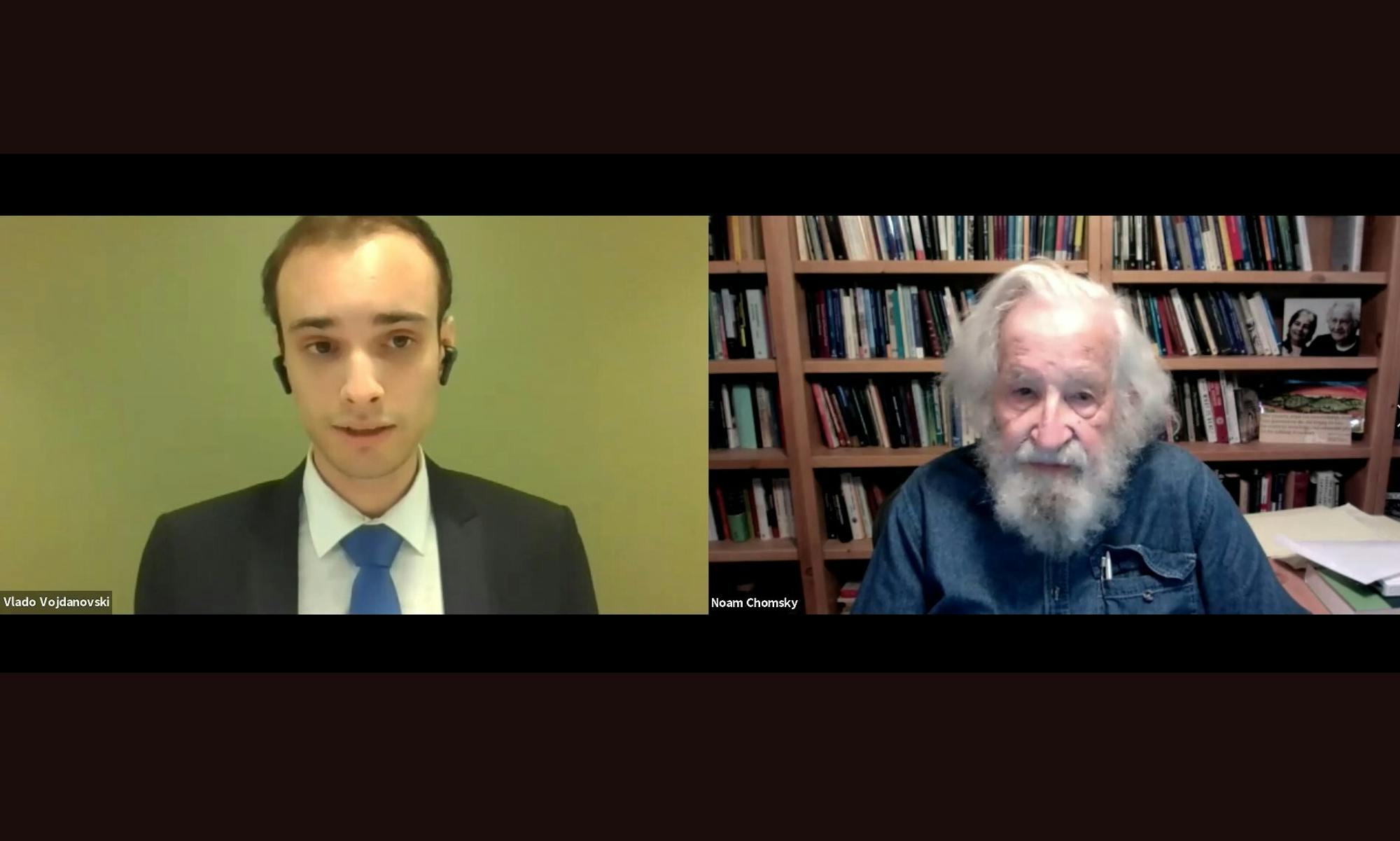Last Friday, linguist, philosopher and anti-capitalist political activist Noam Chomsky joined the Dartmouth Political Union over Zoom for a wide-ranging discussion on political reform, social movements and public engagement. Chomsky, who is 92, has authored over 150 books and is considered one of the most cited scholars alive.
Event moderator Vlado Vojdanovski ’22 said in an interview after the event that DPU reached out to Chomsky over email back in the spring and had originally scheduled to host him in May, but were forced to reschedule for September. Vojdanovski added that the group chose Chomsky specifically for his “thought-provoking analysis of society.”
“It is very interesting to have deep thinkers who are able to look at society from a bird’s eye perspective,” Vojdanovski said, adding that he created a list of 150 questions from which he chose a handful to ask Chomsky. Around 370 attendees streamed Friday’s event.
Vojdanovski began by asking Chomsky for his vision on how Americans can effect change in society. Chomsky said that he believes the U.S. system of concentrated economic power in which the government’s role is reduced compared to other developed countries presents the primary challenge. Chomsky added that increasingly, citizens are not represented by their representatives.
“The role of the people is diminished under the neoliberal system,” Chomsky said. “Electability is very closely related to campaign funding.”
Chomsky said reforming this system will require changing institutional structures in the long term. In the short term, pushing for measures that shift the power in governance from the rich to the poor by increasing taxes on the wealthy will benefit the population, according to Chomsky.
Chomsky added that in ancient Rome, the “ultimate indignity” was to be obedient to an employer. Today, Chomsky said, workers spend “most of their waking life subordinate to a master.” He added that this problem can be alleviated by raising public “consciousness,” comparing it to the 1960s feminist movement’s raising questions that “hadn’t been asked before.”
Chomsky also spoke about the media, which he said has caused Americans to move into “self-reinforcing bubbles.”
“If all you hear is Sean Hannity, it may look like the world is run by liberal elites who want to destroy you,” he said.
Chomsky also said that the First Amendment is “under threat” by the Supreme Court, citing concerns about efforts to ban the discussion of critical race theory in schools.
In response to an audience question about technological automation, Chomsky said that it could be either destructive or freeing.
“One of the things that automation could do is to leave people free to have more fulfilling, creative, independent lives, or, it could be used to destroy people,” Chomsky said.
Jeremy Hadfield ’21 asked Chomsky about the rise in treating psychiatric diagnoses as individual problems; Chomsky replied that the “tendency to turn to these measures [diagnoses] is enforcing social control,” adding that in the move to diagnose individual psychiatric cases, society is throwing huge social problems like the defunding of public education “under the bus.”
Hadfield said he enjoyed the event and seeing Chomsky answer his question.
“Having read so many of his papers, it was just amazing to see him live, though sadly not in person,” Hadfield said in an interview after the event. “I thought it was really cool that he went into his personal stories — he added a ton of insight to his perspective.”
Hadfield added that he appreciated Chomsky’s “blunt honesty.”
In closing, Chomsky responded to an audience question by speaking on how to best spend time as a young professional.
He advised the audience to prioritize “look[ing] at the real world” over their personal interests, pointing to climate change, the “sharply increasing threat of nuclear warfare” and the threat of future pandemics as the most pressing problems facing humanity.
“Your generation is facing a choice, each one has to ask: ‘Do I want to get ahead, or do I want to put efforts into saving human society and millions of other species from destruction?’” Chomsky said. “The question is, how much do you care about personal advancement, and how much do you care about the survival of a livable society — that’s an individual choice.”
DPU debate director Emma Elsbecker ’24 said that while every speaker is significant, the group was particularly excited to host Chomsky in his first time speaking to the College in 10 years.
“Seeing just how involved all the students got with Noam Chomsky, how complex and thoughtful their questions for him were, speaks to the academic integrity of Dartmouth students,” Elsbecker said.





